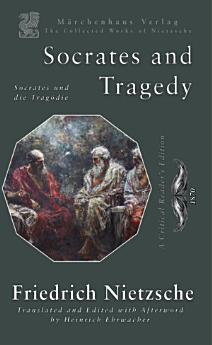Socrates and Tragedy: A New Reader's Edition
May 2024 · The Collected Works of Friedrich Nietzsche Book 11 · Marchen Press
Ebook
122
Pages
family_home
Eligible
info
reportRatings and reviews aren’t verified Learn More
About this ebook
This is one of three major Basel lectures he gave immediately after he accepted a position at the University of Basel. The original German title is "Socrates und die Tragödie". At the young age of 24, Nietzsche accepted a philology professorship in 1869, which facilitated his acquaintance with the composer residing in Tribschen. During this period, Nietzsche delivered three lectures that prefigured his future focus: 'The Greek Musical Drama' on January 18, 'Socrates and Tragedy' on February 1, and the 'The Dionysian Worldview' in July/August 1870. Feeling constrained by philological topics, Nietzsche sought a professorship in philosophy. His writing primarily reflects influences from two significant sources: the philosophy of Arthur Schopenhauer and the musical and theoretical works of Richard Wagner. Socrates and Tragedy was given by the newly minted Professor Nietzsche at the Basel Museum held on February 1, 1870, and subsequently published but the foundation managed by his sister. This lecture was first published in the volume "Gesammelte Werke" edited by Peter Gast (a pseudonym for Heinrich Köselitz, a close associate of Nietzsche) and Elisabeth Förster-Nietzsche (Nietzsche's sister). They were included in the second series of these collected works under the title "Philologica," which was published in 1897. This was part of the effort to compile and publish Nietzsche's unpublished manuscripts and lecture notes after his death. This Critical Reader's Edition offers a modern translation of the original manuscript, designed to help the armchair philosopher engage deeply with Nietzsche's works. The translation features clean, contemporary language with simplified sentence structures and diction, making Nietzsche's complex ideas more accessible. In addition to the main text, this edition includes extensive supplementary material that enhances the manuscript with autobiographical, historical, and linguistic context. It contains an afterword by the translator examining the history, impact, and intellectual legacy of Nietzsche in relation to this work, an index of philosophical concepts with emphasis on Existentialism and Phenomenology, a complete chronological list of Nietzsche's published writings, and a detailed timeline of his life, highlighting the personal relationships that significantly shaped his philosophy.
About the author
Friedrich Nietzsche (1844-1900) was a watershed German philosopher, cultural critic, poet, musician (briefly) and philologist (the study of ancient manuscripts) whose work has had a profound impact on modern intellectual history. Known for his critiques of European morality and religion (particularly Protestantism), Nietzsche's ideas on the "will to power" and the "Übermensch" have influenced a wide range of philosophical, literary, and psychological thought including thinkers such as Martin Heidegger, Albert Camus, Michael Foucault and the entire Postmodern religion.
Rate this ebook
Tell us what you think.
Reading information
Smartphones and tablets
Install the Google Play Books app for Android and iPad/iPhone. It syncs automatically with your account and allows you to read online or offline wherever you are.
Laptops and computers
You can listen to audiobooks purchased on Google Play using your computer's web browser.
eReaders and other devices
To read on e-ink devices like Kobo eReaders, you'll need to download a file and transfer it to your device. Follow the detailed Help Center instructions to transfer the files to supported eReaders.











